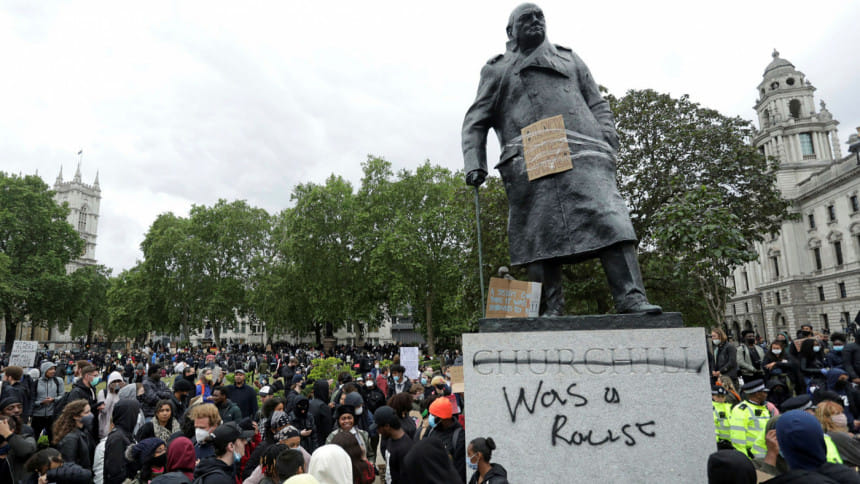The gaping holes in our history lessons

Growing up, history had never been a favourite subject of mine. Naturally, memorising innumerable dates and difficult names is not any 15-year-old's preferred choice of activity. As I recall those lessons now, I realise that the mindless memorisation was not in fact our biggest problem, instead, it was the stories that they chose to tell us and the ones they suitably left behind.
Descending from Great Lies
Perhaps if my eighth grade teacher hadn't so deeply venerated Churchill as a hero and unabashedly glorified the contributions of the British Empire, I would understand much sooner that there's more to Zainul Abedin's 1943 Bengal famine paintings than a couple of starving children on the streets. Perhaps, if I was introduced to the other side of the horrific story, I would slowly develop the ability to be more conscious earlier on and not allow my worldview to be reduced to such Eurocentric notions. Of course, this single lesson had not been the only influential factor, but denying its part would be foolish, as contemporary history lessons continue to be steeped in faulty ideologies.
As one would expect, my own experience is not unique to many of those around me. Zohra Ahmed*, 21, a first-year university student similarly believes that her school had failed at teaching her the important facts. She says, "My history classes never discussed anything related to the oppression that Christopher Columbus inflicted on the native people upon his arrival, but went at lengths to have us believe that he was some sort of hero, an explorer, who had noteworthy achievements. It wasn't until I learned about the controversy of celebrating Columbus Day that I came to realise how misinformative my lessons truly had been."
Another recent school graduate, Anil Zaman, 19, had also expressed his discontent, saying, "I went to a Bangla medium school, so while the figures may have been different, they were equally problematic. I was taught to believe that Gandhi was a benevolent leader who struggled for India's independence, but nothing about his racially discriminatory views and exploitation of young women."
We often fail to realise that these very stories hold significant power to construct a child's understanding not only of the world but also of themselves, and we commit a gross disservice to them by perpetuating problematic narratives through these lessons. Be it an English or a Bangla medium school, the problem remains pervasive in both systems. These sanitised versions of history do nothing to protect us as children, and instead end up creating adults who are not equipped to critically engage in nuanced conversations about current world issues, as we fail to make crucial connections between the present and the past.
Inevitably, it comes as no surprise that most students in our country continue to harbour prejudiced opinions of this kind. After all, can they be blamed?
Rethinking Our Lessons
In recent times, educators from around the world have raised concerns about not teaching students the difficult truths of our past. While addressing such sensitive issues isn't a simple task, they believe that teachers can offer small glimpses in a simplified and age-appropriate manner. Even though students may be too young to entirely grasp the complexities of these topics, it would certainly open up room for counter-narratives. Several organisations such as Rethinking School and Teaching Tolerance based in America have been working towards accomplishing these very goals. Unfortunately, there aren't many such initiatives in our part of the world, but these organisations along with several resources available online can serve as effective models to take a step forward.
We live in increasingly turbulent times where it has become much harder now to deny the existence of institutionalised ignorance and it certainly demands that we prepare our students with deeper purposes of knowledge and learning.
*Name has been changed for privacy
Sometimes when Nafisa isn't crippled by self-doubt and procrastination, she writes and paints things. You can reach her at [email protected]

 For all latest news, follow The Daily Star's Google News channel.
For all latest news, follow The Daily Star's Google News channel. 



Comments